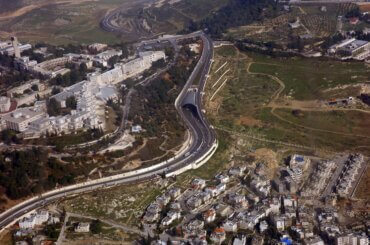This is part of Marc H. Ellis’s “Exile and the Prophetic” feature for Mondoweiss. To read the entire series visit the archive page.
On the 20th anniversary of the assassination of Prime Minister Yitzhak Rabin, Isabel Kershner of the New York Times writes that Israelis on both sides of the political spectrum have reached a “pragmatic” consensus on the way forward. Her summation of this pragmatism: There aren’t going to be two states, Israel and Palestine; There isn’t going to be one state, Israel-Palestine.
The debate about ideology and pragmatism in politics is longstanding. In the political realm negotiated settlements are often achieved while proclaiming ideological ends for the future. Pragmatism comes and goes by many names.
But a pragmatism that is defeatist and oppressive has to be questioned. Kershner’s pragmatism is both. The future of this pragmatism is a violently aggressive Israel. And a permanently ghettoized Palestine.
Is this what Rabin wanted on the night he was assassinated? Like the pragmatism Kershner reports on, Rabin’s vision of the future is still contested. As one of the founding military and political men of Israel, a confessed ethnic cleanser and settlement builder, had Rabin changed his attitudes toward Palestinians during his last days?
In a full page paid statement in the Times honoring Rabin, the S. Daniel Abraham Center for Middle East Peace takes one possible middle road. The statement quotes Rabin: “Separation between Israel and the Palestinians is the best solution for resolving the Israeli-Palestinian conflict.” In parsing Rabin’s statement. the rationale is clear. For Rabin, separation was to preserve the Jewish and democratic character of Israel against the demographic threat of a Palestinian majority. The sponsors of the statement updates Rabin’s vision for today: “In 2020, the Jewish population from the Mediterranean Sea to the Jordan River with only be 49%. For those who love Israel, and want it to remain a Jewish state, the time to act is now.”
However their motivations are judged, the sponsors of the message hold fast to a political arrangement that has evolved since Rabin’s assassination. If for progressive Jewish Israelis, a two state solution was preferable and, in their mind, just, today such a view is mindless. No one believes that a two state solution is on the horizon or even possible anymore.
So the correct question on Rabin’s anniversary is where he would stand today? Would Rabin stand in opposition to Netanyahu, a foe in his own day and one who has held power since his assassination? If so, how would that opposition manifest itself? Where would Rabin draw the redline on Israel’s expansion and the desire of Palestinians to be free in their own homeland?
If alive today it’s likely Rabin would fit nicely into the “pragmatic” Israeli consensus as he did during his lifetime. Did Rabin ever stand anywhere else?
Rabin’s pragmatism was the pragmatism of the powerful. Celebrating such a figure in Jewish history is telling.
The life of Yitzhak Rabin is part of the downward spiral where Jews come to accept the denigration and oppression of another people as “pragmatic.” For in the end, permanently ghettoizing the Palestinian people is the true legacy of Yitzhak Rabin.



Thanks for this article. It’s getting really old seeing articles suggesting Rabin was some kind of heroic peace maker. The guy was a murderous thug and a racist. He was assassinated because he wasn’t murderous or racist enough for the uber-crazy ultra-Zionists.
For Palestinians, Yitzhak Rabin is remembered as the “bone-crusher”
http://www.aljazeera.com/news/2015/10/remembering-yitzhak-rabin-151031154848727.html
“had Rabin changed his attitudes toward Palestinians during his last days?”
Gosh, that’s a good question. Good enough to kill him over. And even if the answer was “no”. Just the question was enough.
Truly telling is Ellis conjuring up this motley analysis to suit his fancy. There is no sense of celebration in this commemorative event which can legitimately be viewed as a major milestone in the modern history of Israel.
Rabin has a conflicted legacy.
Probably Assad is another example of a conflicted leader. He is better than the main opposition, ISIS, because he is secular and moderate in religion and tolerates Christians and wants good relations with the rest of the world. But he is authoritarian in his ruling style.